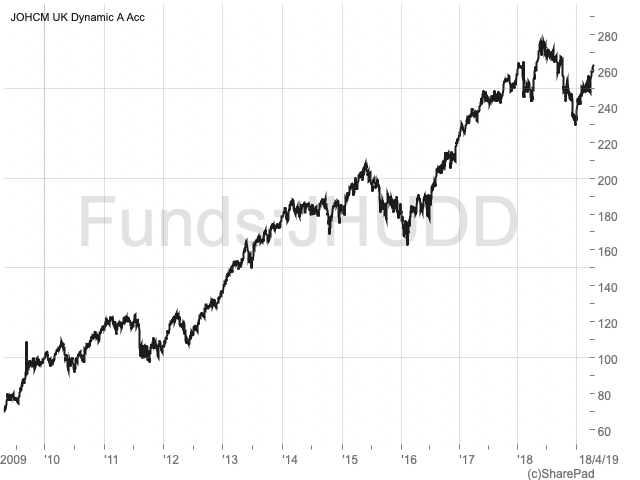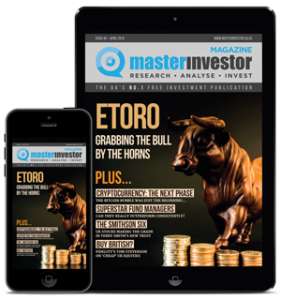Can superstar fund managers outperform consistently?

With all of the thousands of different funds available in the market, it is inevitable that some will deliver outstanding performance relative to the rest. When this happens over an extended period of time, it becomes more noteworthy and is often attributed to the skill of the manager who receives star billing. The big challenge is whether they can repeat their success, especially if they attract a big money move elsewhere.
Recent research by Willis Owen suggests that funds run by star managers tend to experience a significant drop in their outperformance when the incumbent leaves their role. The study found that the average active annualised returns when measured against the sector average fell by almost 90% from 3.63% to 0.38%.
The analysis looked at the performance of 15 funds that lost star talent between 2013 and 2017, with the departees including Schroder’s Richard Buxton, Invesco’s Neil Woodford and Stewart Investors’ Angus Tulloch.
Adrian Lowcock, head of personal investments at Willis Owen, says that investors shouldn’t ignore star managers, but it is also presumptuous to think that the only thing that made them a star is their own ability. “I think the right environment, team and controls are required to support a star manager, so if they leave to go to somewhere else it is important that the new firm has those controls in place”, Lowcock added.
Falling star
One of the highest profile managers who may have fallen victim to this is Neil Woodford, who made his reputation at Invesco Perpetual. Between 1988 and 2014, his High Income fund made an average annual return of 13.24%, which was comfortably ahead of the 9.3% recorded by the FTSE All-Share index.
| First seen in Master Investor Magazine
Never miss an issue of Master Investor Magazine – sign-up now for free! |
When he left to set-up his own company, Woodford Investment Management, he attracted a huge amount of investor interest. Those who followed him were well rewarded as in the first two years his Woodford Equity Income fund returned a little over 20%, compared to the sector average of just 9.7%, but since then it has all gone horribly wrong.
“Woodford made his name on a large call on tobacco stocks, whilst successfully avoiding financials. To achieve the performance he did, he has had to be very contrarian, which means being out-of-favour with the rest of the market. He has tried this approach again with pharmaceuticals and more recently with residential property,” explains Lowcock.
At one point hisWoodford Equity Income fund had more than £10bn in assets under management, but the combination of poor performance and investor outflows has sent the figure plummeting to less than £5bn. This has led him to swap some of his illiquid, unquoted holdings for shares in his Woodford Patient Capital Trust (LON:WPCT), although this vehicle has also been struggling.
“The processes that Woodford had been used to at Invesco were more robust than at his own firm, which means that the controls have not been as effective nor the challenge to his decisions as strong. This has led to some stock specific and portfolio construction issues. If he fails to deliver in a post-Brexit world then I think investors will lose patience with him,” warns Lowcock.
Poached or scrambled?
Darius McDermott, MD of Chelsea Financial Services, says that star fund managers are worth following. “There are a handful of fund managers who have managed to outperform their index and their peer group most years, over a very long time period. This is not easy and their consistency in doing so is evidence of their skill.”
Hiring a star manager is normally a successful way of attracting new investors to a firm, hence the reason that they tend to be poached once they have established their reputation.A good example of this is Richard Buxton, who achieved considerable success running the Schroder UK Alpha Plus fund until he left to join Old Mutual Global Investors − now Merian Global Investors − in 2013.
Buxton’s £1.8bn Merian UK Alpha fund has a concentrated portfolio of 34 holdings, but his famed stock picking ability doesn’t seem to have been up to scratch at his new firm. The fund has only returned 22.5% over five years compared to a sector average of 28.7% making it a fourth quartile performer.
McDermott acknowledges that Buxton has had a difficult few years and says that the underperformance has partly been due to a couple of stock-specific issues, but is mainly because he hasn’t ‘enjoyed’ QE.
“The suppression of bond yields (through very low interest rates) has distorted valuations in the stock market with growth stocks getting more expensive and value stocks getting cheaper. This means he has had a ‘style headwind’.”
Buxton was also CEO of his new company for a number of years, during which he took it through a management buyout and brand change, which may have been a distraction from his asset management responsibilities.
“He is now focused purely on the funds he is running and is just as passionate as ever. He has a number of new stocks on his radar, which he may be adding to the portfolio shortly and which he thinks could have material upside potential. I fully believe that he can turn the performance around,” notes McDermott.
Growth managers in vogue
Sometimes an investment style can outperform for years and this can help the managers that operate in that area, while hindering those that don’t. This has been particularly evident since the 2008 financial crisis when growth has beaten value hands down, with two of the highest profile beneficiaries being Terry Smith and Nick Train.
| First seen in Master Investor Magazine
Never miss an issue of Master Investor Magazine – sign-up now for free! |
“If a style becomes out-of-favour there is very little a manager can do, it is often just a case of them being patient and continuing to do their job whilst they wait for the market to turn.This is the only real approach they can take as changing style can be much more damaging to investors’ wealth and the manager’s reputation,” explains Lowcock.
Terry Smith’s £17.5bn Fundsmith Equity fund is ranked second out of the 307 funds in the Global Sector with a 5-year return of 150.1%. Smith uses extremely stringent investment criteria that very few companies meet, hence the reason for the concentrated 27-stock portfolio.
Smith’s fantastic performance record enabled his Smithson Investment Trust (LON:SSON) to raise a record breaking £822.5m when it floated on the London Stock Exchange last October, despite the fact that he is only offering ‘support and advice’ to the managers.
Another star growth manager who applies tough investment criteria is Nick Train. His £6.2bn Lindsell Train Global Equity fund is ranked just behind Fundsmith Equity in third place in the Global sector with a 5-year return of 142.5%, while his Lindsell Train UK Equity fund and Finsbury Growth & Income Trust (LON:FGT) are also highly regarded.
“Both Terry Smith and Nick Train sit at the top of their peer group and their investment philosophy has certainly been in a sweet spot, but it is as a result of hard work and analysis,” notes Lowcock.
Star income managers
Ben Willis, head of portfolio management at Chase de Vere, says that investing is an inexact science, but there are managers who clearly can deliver better relative and/or absolute returns than their peers over the long-term.
“These people are worth following but not in isolation. As we have seen over the years, star fund managers are not infallible and will suffer periods when they underperform.”
One example isHenry Dixon, who has run the Man GLG UK Income fund since October 2013. Over the last five years it has returned 58.73% compared to a sector average of just 27.8%, which puts it in first place out of the 77 funds operating in its peer group.
Willis says that it is important to remember that although Dixon has enjoyed success over the medium to long-term, there have been periods when his style has been out-of-favour and he has materially underperformed.
“Clearly, he has designed a philosophy and process that can work over the long-term and this is one of the basic tenets of investing, which we tend to lose sight of – that investing in equities is a long-term game.”
Operating in the same sector is the £5.5bn Artemis Income fund that has been managed by Adrian Frost since January 2002. Since the launch in June 2000, it has returned almost 400%, which is three times the return of the FTSE All-Share index, and is ranked first out of the 26 funds in the sector that have been in existence over the same time period.
Laith Khalaf, senior analyst at Hargreaves Lansdown, says that Adrian Frost is one of the most experienced UK Equity Income managers.
“He looks for companies that can sustain a growing dividend, and for them this means a strong focus on companies delivering high cash flows. Frost has used the same disciplined approach for decades with great success, and we think the fund could be a great core holding for investors looking for a growing and sustainable income well into the future.”
European star
Another outperformer is Alex Darwall who runs the Jupiter European fund and the Jupiter European Opportunities Trust (LON:JEO). The £5.3bn Jupiter European has a concentrated 40-stock portfolio and over the last ten years of Darwall’s tenure has returned 335%, which is more than double the benchmark and sector average, making it the top ranked performer out of 74.
| First seen in Master Investor Magazine
Never miss an issue of Master Investor Magazine – sign-up now for free! |
Khalaf says that managers can consistently outperform, though there are no guarantees, so investors should never keep all their eggs in one basket.
“We decompose the returns by style, sector, and geography to see whether their record can be explained by simply being in the right place at the right time, or the result of stockpicking skill, which is what we are looking for. If a manager demonstrates significant outperformance on this basis over a full economic cycle (at least seven years) then it’s much more likely to be repeatable.”
The analysts at Hargreaves Lansdown like managers that stick to their guns through the ups and downs, and as their particular style comes in and out of fashion, and that’s something Alex Darwell has done with his portfolio.
“He has always looked for special companies that are in control of their own destiny, and believes that holding those companies for the long-term is what drives success,” explains Khalaf.
Both of Darwall’s funds have had a tough few months following allegations of financial wrongdoing at their biggest holding, a German payments company called Wirecard. This stock accounts for almost 9% of the open-ended fund and 14.7% of the investment trust.
FUND OF THE MONTH
JOHCM UK Dynamic was launched just over 10 years ago and was designed and managed throughout by Alex Savvides, who has been tipped by both Chelsea Financial Services and Chase de Vere.
McDermott says that Savvides invests in UK companies that are undergoing substantial positive change that is unrecognised in the current share price.
“Each holding in the portfolio must pay a dividend, a discipline designed to underpin the valuation and limit the impact of mistakes. The result of this is that, unusually for a UK All Companies fund, it also provides a reasonable level of income, currently 3.4%.”
His value style of management has largely been out of favour for most of the last decade, yet despite that the fund has beaten its peer group average in 8 of the 10 past calendar years, and this means the performance since launch has been first quartile, with a return of 195.85%, compared to just 96.7% for the UK All Companies sector average.
The £1.2bn fund provides exposure to a concentrated 45-stock portfolio of UK shares, with the largest holdings including the likes of BP, Shell, GSK, Anglo American, Lloyds Bank and HSBC. It has generated an average annualised return since launch of 10.5%, compared to just 6.2% from its FTSE All-Share benchmark.
Fund Facts
Name: JOHCM UK Dynamic
Type: UCITS
Sector: UK All Companies
Total Assets: £1.2bn
Launch Date: June 2008
Historic Yield: 4.17%
Ongoing Charges: 0.79%
Website: www.johcm.com


Comments (0)